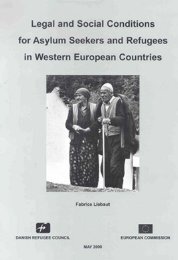Bulgaria - The social impact of seasonal migration
Bulgaria - The social impact of seasonal migration
Bulgaria - The social impact of seasonal migration
Create successful ePaper yourself
Turn your PDF publications into a flip-book with our unique Google optimized e-Paper software.
One should make a disclaimer on these data. First, the rubric "current private transfers"<br />
contains not only remittances, but transfers from abroad <strong>of</strong> any kind. <strong>The</strong> <strong>Bulgaria</strong>n<br />
National Bank does not yet have a precise methodology to calculate the amount <strong>of</strong><br />
remittances only. Lacking a geographic indicator too, it can distinguish neither between<br />
transfers from the USA, Germany, France, etc., or between transfers to S<strong>of</strong>ia, Plovdiv,<br />
Varna or other <strong>Bulgaria</strong>n cities. However, representatives <strong>of</strong> the <strong>Bulgaria</strong>n National Bank<br />
are aware <strong>of</strong> the growing importance <strong>of</strong> remittances for the balance <strong>of</strong> payments in the<br />
country and are in the course <strong>of</strong> elaborating a finer methodology to calculate them.<br />
Unaccountable for are also the money transferred cash from <strong>Bulgaria</strong>ns returning from<br />
abroad. It is a wide-spread practice <strong>of</strong> temporary <strong>seasonal</strong> emigrants to carry money<br />
personally on their way back home, for they are not obliged to declare sums below 5<br />
000 BGN (3 012 USD) on the <strong>Bulgaria</strong>n border.<br />
Despite the considerable size <strong>of</strong> remittances, local authorities have not thought about<br />
calculating the amount <strong>of</strong> money coming to their municipalities through the labour <strong>of</strong><br />
<strong>Bulgaria</strong>n emigrants abroad. According to the secretary <strong>of</strong> Momchilgrad municipality -<br />
Kurdzhali region, with a concentrated presence <strong>of</strong> <strong>Bulgaria</strong>n Turks - her institution had not<br />
attempted to identify this money as a viable financial resource to be appropriately<br />
channelled in the local economy (interview No. 28). In spite <strong>of</strong> the widespread beliefs that<br />
the remittances in the region <strong>of</strong> Kurdzhali are at least 100 million EUR a year, she<br />
conceives <strong>of</strong> them as a "dead capital", immobilised into purchases <strong>of</strong> apartments, houses<br />
or luxury cars. "This money does not circulate, does not serve the local business", adds the<br />
secretary who is convinced that receiving EC programmes' grants is the only mechanism<br />
for stimulating the regional economy. In her opinion, money from <strong>seasonal</strong> workers<br />
abroad is not significant, because such people work primarily in low-wage sectors, do not<br />
bring a lot <strong>of</strong> money, and whatever they bring is used for consumption (<strong>of</strong>ten conspicuous<br />
- "Momchilgrad municipality is the region with most Mercedes cars per person in the whole<br />
country", interview No. 28).<br />
Low wages and insufficient start-up capital is the reason stated by migrants themselves<br />
when asked why they had not contemplated beginning a small business in their home<br />
places. "Money is little. How much could one save for a year? Less than 10 000 levs,<br />
maximum 800 levs per month. That is it, this is not enough for business", says a <strong>seasonal</strong><br />
migrant who had worked in the construction industry and the greenhouses in the<br />
Netherlands (interview No. 34). According to his calculations, one should work there for 4-<br />
5 years in order to save enough for starting up a small private enterprise. With a salary <strong>of</strong><br />
around 800-900 EUR, and expenses for rent at 150 EUR and food at 150-200 EUR per<br />
month, saving for opening up <strong>of</strong> a small business at home seems a very long-term strategy<br />
to the <strong>seasonal</strong> migrant.<br />
Yet the pattern <strong>of</strong> allocating migrants' money to houses and apartments has boosted the<br />
market <strong>of</strong> immobile property in the region, whose prices have increased significantly in<br />
the last years. On the one side, there are numerous apartments and houses, emptied as<br />
a result <strong>of</strong> the mass e<strong>migration</strong> <strong>of</strong> <strong>Bulgaria</strong>n Turks to Turkey throughout the 1990s, and<br />
from the other - <strong>seasonal</strong> workers with savings in euro who are able to buy more<br />
expensive property.<br />
However, the mayor <strong>of</strong> Kirkovo municipality - an ethnically mixed region on the<br />
<strong>Bulgaria</strong>n-Greek border in South-eastern <strong>Bulgaria</strong>, inhabited by <strong>Bulgaria</strong>n Muslims<br />
(Pomaks) - believes the situation in Momchilgrad is much better than in his area where<br />
<strong>seasonal</strong> labour <strong>migration</strong> is also a pronounced pattern, with flows directed to <strong>The</strong><br />
Netherlands, Belgium, Spain, Israel, less Germany and increasingly Greece. This is so<br />
49

















